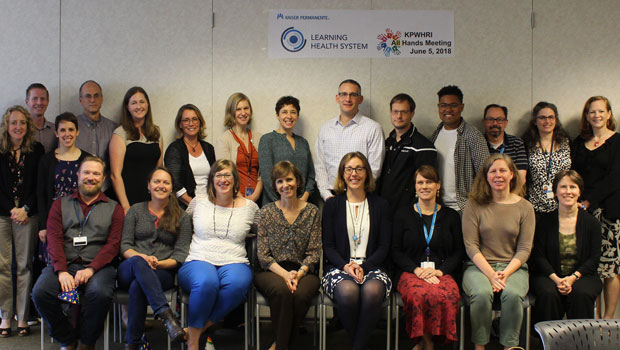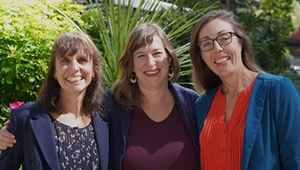How the LHS Program helps us be best at getting better

One year in, leaders of Kaiser Permanente Washington’s Learning Health System Program describe how research-care delivery partnerships drive continuous learning
By Learning Health System Program Co-directors Paula Lozano, MD, MPH; Katie Coleman, MSPH; and Emily Westbrook, MHA
Last June, Kaiser Permanente Washington launched its Learning Health System (LHS) Program to strategically leverage the resources and capabilities available at Kaiser Permanente Washington Health Research Institute (KPWHRI).
On June 5, 27 researchers from across KPWHRI gathered to share our experiences working in Kaiser Permanente Washington’s Learning Health System (LHS) Program. It was our first opportunity to bring together everyone who works on the research side of our many LHS partnerships, and the timing couldn’t have been more fitting: Our program had just turned one year old, and we were nearing the halfway point for our 2018 projects.
The event gave us an opportunity to celebrate and reflect on these important milestones. But more importantly, it gave us an opportunity to learn from each other. And as our name suggests, learning is at the heart of our program.
Kaiser Permanente Washington established the LHS Program as part of its commitment to being the best at getting better. The Program leverages the Institute’s world-class research capabilities and helps create a culture of continuous learning based on partnerships among researchers and operational leaders across the organization. These partnerships enable us to learn from research, our patients, and our staff to provide better care for our members today — and to anticipate the kind of care they will want and need tomorrow.
How and why our researchers are contributing to the LHS Program
To this end, KPWHRI researchers and staff are contributing to a wide range of LHS partnerships that align with Kaiser Permanente Washington’s bold future objectives related to quality, affordability, service, and growth. Our 3 pillar projects for 2018 include:
· Advanced analytics: Dr. David Arterburn is leading the Institute’s work on 2 initiatives that use predictive analytics and variation analysis to improve quality of care and lower costs.
· Linking research evidence and best practice to innovative clinic design: Katie Coleman is leading the synthesis of research evidence and the design of rapid assessment approaches to inform the design of new clinics in the region.
· Implementation support: Dr. Cara Lewis and other implementation experts at KPWHRI are supporting the rollout and evaluation of the Community Resource Specialist (CRS) role in primary care. (The CRS is a primary care team member who connects patients with community-based resources to help them carry out their care plan and be active in their own care.)
In addition, more than two dozen others at the Institute are serving as formal and informal consultants on projects aimed at achieving excellence in cancer care, strengthening our care delivery system, exploring the potential of genomics, and many others.
In total, these efforts span the Institute and amount to nearly 3,100 hours worked in the first half of 2018. At the June 5 event, we discussed the benefits, challenges, and positive impacts we’ve observed through our LHS work. And we came away with many compelling ideas and insights on how we can keep up our good learning, optimize our contributions to our LHS partnerships, and boost our impact.
We also came away with a renewed sense of why we’re all passionate about being part of this work: We get a unique opportunity to apply our skills and capabilities to help our organization provide the best possible care to our members.
Scientific expertise is key — and partnerships are our foundation
One core component of the LHS Program that is helping shape the future of health care is our work in advanced analytics. Like most health systems, Kaiser Permanente Washington routinely collects data about patient’s experiences, treatments, and health outcomes. By tapping into the Institute’s methodological expertise and advanced analytic capabilities, we can turn this vast amount of data into valuable knowledge about which treatments and services are most likely to help individual members.
Our expertise in implementation science is another core component of the LHS Program that helps us continually provide better care for our members. When Kaiser Permanente Washington identifies a clinical change or best practice it wants to implement, as it recently did with the CRS role, our scientists can help them do it more effectively. We use state-of-the art approaches to practice facilitation, quality improvement methods, and evaluation to support lasting change and make scale and spread more efficient.
But what truly makes our work in these areas possible is the relationships we build with our partners in care delivery. It’s our efforts to understand the context of each question our partners ask — and to communicate how research can help find the answers.
These strong partnerships between research and care delivery fuel the LHS Program and make us better able to identify and act on opportunities to put the best evidence into practice, test innovative ideas, and implement changes that lead to better, more affordable care. Even more important, each partnership brings us a step closer to the aspirational goal of learning from every patient, in every encounter, every day — so we’re continually finding new ways to be the very best at what we do.
Kaiser Permanente Washington Learning Health System Program co-directors are:
· Paula Lozano, MD, MPH, senior investigator at KPWHRI and associate medical director for research and translation at Kaiser Permanente Washington
· Katie Coleman, MSPH, research associate at KPWHRI’s MacColl Center for Health Care Innovation
· Emily Westbrook, MHA, director of KPWHRI’s Research Project Management Office.
Learn more about Kaiser Permanente Washington Health Research Institute. Sign up for our free monthly newsletter.
ACT Center

New center focuses on equitable, whole-person health care
Kaiser Permanente launches the Center for Accelerating Care Transformation.


